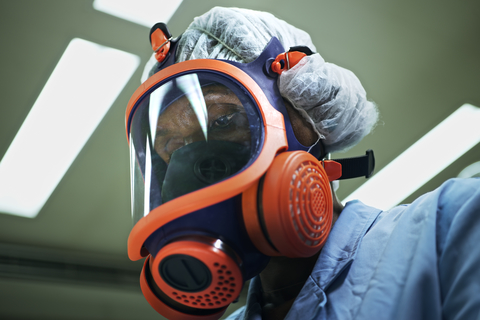Loss of sense of smell may be a clue you have coronavirus

Doctor groups are recommending testing and isolation for people who lose their ability to smell and taste, even if they have no other symptoms.
For accurate and up to date information on coronavirus please go to gov.uk/coronavirus. If you’re outside the UK please see the information on coronavirus from your national and local authorities.
The New York Times reports anosmia, the loss of sense of smell, and ageusia, an accompanying diminished sense of taste, have emerged as peculiar telltale signs of Covid-19, and possible markers of infection.
On Friday British ear, nose and throat doctors, citing reports from colleagues around the world, called on adults who lose their senses of smell to isolate themselves for seven days, even if they have no other symptoms, to slow the disease’s spread. The published data is limited, but doctors are concerned enough to raise warnings.
Prof Claire Hopkins, president of the British Rhinological Society, wrote in an email “We really want to raise awareness that this is a sign of infection and that anyone who develops loss of sense of smell should self-isolate. It could contribute to slowing transmission and save lives.”
She and Nirmal Kumar, president of ENT UK, a group representing ear, nose and throat doctors, issued a joint statement urging health care workers to use personal protective equipment when treating any patients who have lost their senses of smell, and advised against performing nonessential sinus endoscopy procedures on anyone, because the virus replicates in the nose and the throat and an exam can prompt coughs or sneezes that expose the doctor to a high level of virus.
Claire Hopkins said two ear, nose and throat specialists in the UK who have been infected with the coronavirus are in critical condition. She said earlier reports from Wuhan, where the coronavirus first emerged, had warned that ear, nose and throat specialists as well as eye doctors were infected and dying in large numbers.
The British doctors cited reports from other countries indicating that significant numbers of coronavirus patients experienced anosmia, saying that in South Korea, where testing has been widespread, 30% of two thousand patients who tested positive experienced anosmia as their major presenting symptom (these were mild cases).
The American Academy of Otolaryngology on Sunday posted information on its website saying that mounting anecdotal evidence indicates that lost or reduced sense of smell and loss of taste are significant symptoms associated with Covid-19, and that they have been seen in patients who ultimately tested positive with no other symptoms.
The academy said the symptoms, in the absence of allergies or sinusitis, should alert doctors to screen patients for the virus and “warrant serious consideration for self isolation and testing of these individuals”. The organisation has reminded its members that the Centers for Disease Control and Prevention has urged all clinicians to prioritise urgent and emergency visits for the next several weeks and to reschedule elective and routine procedures.
A notice posted on the academy’s website on Friday said “There is evolving evidence that otolaryngologists are among the highest risk group when performing upper airway surgeries and examinations. A high rate of transmission of Covid-19 to otolaryngologists has been reported from China, Italy and Iran, many resulting in death.”
Dr Rachel Kaye, an assistant professor of otolaryngology at Rutgers University, said colleagues in New Rochelle, New York, which has been the centre of an outbreak, first alerted her to the smell loss associated with the coronavirus, sharing that patients who had first complained of anosmia later tested positive for the coronavirus. She said “This raised a lot of alarms for me personally” because those patients “won’t know to self quarantine.”
She said “Most ENTs have on their own accord tried to scale down”, adding that her department at Rutgers had already started using personal protective equipment and stopped performing nonessential exams.
In the areas of Italy most heavily affected by the virus, doctors say they have concluded that loss of taste and smell is an indication that a person who otherwise seems healthy is in fact carrying the virus and may be spreading it to others.
Dr Marco Metra, chief of the cardiology department at the main hospital in Brescia, where seven hundred of the one thousand two hundred inpatients have the coronavirus, said “Almost everybody who is hospitalized has this same story. You ask about the patient’s wife or husband. And the patient says, ‘My wife has just lost her smell and taste but otherwise she is well.’ So she is likely infected, and she is spreading it with a very mild form.”
Hendrik Streeck, a virologist from the University of Bonn who went from house to house in Germany’s Heinsberg district to interview coronavirus patients, has said in interviews that at least two thirds of the more than a hundred people he talked to with mild disease reported experiencing loss of smell and taste lasting several days.
Another doctor who studied a cluster of coronavirus patients in Germany said in an email that roughly half of the patients had experienced a smell or taste disorder, and that the sensory loss usually presented after the first symptoms of respiratory illness, but could be used to distinguish people who should be tested.
Dr Clemens Wendtner, a professor of medicine at the Academic Teaching Hospital of Ludwig-Maximilians University of Munich, said that the patients regained their ability to smell after a few days or weeks, and that the loss occurred regardless of how sick they got or whether they were congested. She said using nasal drops or sprays did not help.








